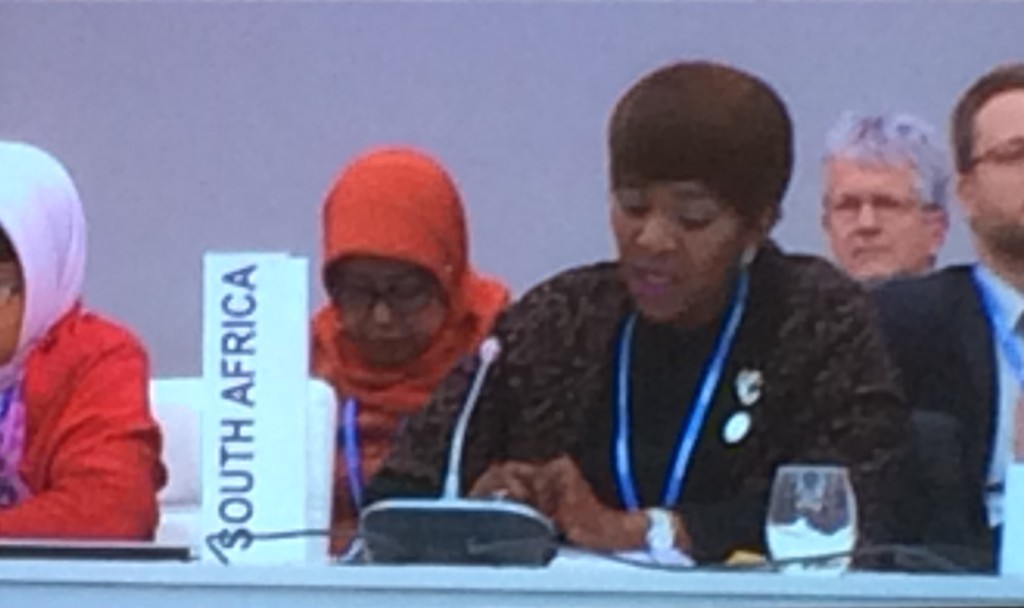
 Animals from “Noah’s Ark of the climate”, by artist Gad Weil, on display here at COP21.
Animals from “Noah’s Ark of the climate”, by artist Gad Weil, on display here at COP21.“The pace has been slow and we have many issues that remain unresolved.”
“…progress was too slow.”
“We need a change in the mode of work.”
“The parties have engaged actively… but the pace, in my view, is nowhere near fast enough.”
“The parties have expressed clearly… support for transparency. Like others, the pace is not good enough. We will continue to work tonight.”
One after another, thus went the summary statements about the negotiations from the facilitators of the various groups. This was part of an update last night on the progress of the negotiations so far. It was attended by the lead negotiators of the various countries, as well as the COP President. As you can see, there was a consensus that not enough progress is being made toward the goal of having an agreed-upon text by noon on Saturday.

After the updates from the facilitators, the chair of the meeting opened the floor to the individual country representatives who were present. At that point, the tone and focus changed dramatically. The ambassador from South Africa, speaking on behalf of the G77 (a coalition of developing countries) and China, expressed “some concerns with the process.” She spoke of the proliferation of spinoff and informal discussions, sometimes on the same issue and taking place simultaneously. She also noted that sometimes these were announced at the last minute, and asked for better advance notification of schedules.
In addition to concerns about scheduling, she made some specific requests on behalf of the countries for which she was speaking. One concrete request was for the UNFCCC to compile the various edits that had been produce so far in the various negotiating groups, and to produce a new master (but still provisional) text that would be made available to all parties in the morning. I assume that the goal of this was to allow them (and everyone else) to get a better sense of where things stand, since issues being discussed in one part of the text will have impact on other parts of the text. (The chair of the session later agreed to this request, and the new text is out this morning.)
After South Africa spoke, the representative from Malaysia spoke, saying that he was speaking on behalf of like-minded developing countries. He said that he supported everything in the previous statement, adding that the pace of the negotiations was “punishing.” As an example, he cited three parallel processes on mitigation taking place in three difference rooms. He said, “We cannot sacrifice a durable agreement at the altar of expediency,” saying that some of the countries were beginning to feel left out.
Apparently this is a perennial problem at the COPs. The smaller and/or less-developed countries have smaller delegations, and thus it is harder for them to have a presence at multiple sessions taking place simultaneously, and to keep up long negotiations that can stretch well into the evening hours. In fact, some of the observers who are here come to COP specifically to help smaller states navigate the process, so that they have extra bodies to track what is going on in various parallel sessions (though observers have much less access than party delegates do).
I don’t have the experience to gauge whether these concerns are worse at this particular COP, given the urgency and the relatively short deadline of trying to agree on a provisional text by Saturday, and how much this is viewed as part of the process. But having read about this before the COP, it was interesting to see it playing out in real time.
After these statements, several other countries were given the floor to make statements. One interesting bit of procedure that I noted: it appears that parties request the floor by turning their country nameplates on their side, so that they are sticking up in the air. (You can see this in the photo above.) I couldn’t see everything that was happening (we were watching on closed-circuit TV from another room), but everyone who spoke had an upended nameplate, and they put it back down when they finished speaking, so this appeared to be what was going on.
Some of the remaining discussion amounted to parties saying to each other, “No you need to be more flexible,” albeit in a diplomatic way. Other countries weighed in with additional comments on the fast pace or the need for progress.
The final statement came from the representative from Mexico, who said, “We have talked about urgency for a long time, but this is the place to show it.” The negotiations are continuing today, and it will be interesting to see whether the collective sense of urgency produces more progress.
Instead of countries saying that they need to “cooperate”, why don’t they just fix their own problems with the environment. They all want to improve it, so why don’t they at home instead of messing in Paris? This solution makes sense because it would be more efficient and would be easier because people hate each other.
– Ian and Vincent
Hi Ian and Vincent,
You are right that the solutions will have to come from individual countries working to improve things in their own country. Every country here has submitted a plan about what they will do to improve. The reason for an international agreement is to help find ways to get countries to stick to those plans – it’s sort of like homework. You know that you could learn things by doing reading or assignments on your own, but if you’re not required to do so, it’s hard to get motivated to do it. (At least it is for me.) The other reason is that working together means that there is peer pressure for countries to do more – it won’t be easy to do, so knowing that others are contributing too will help motivate countries to stick to their plans.
Seeing thousands of people here from all over the world, working on this issue, it’s quite clear to me that most people don’t hate each other. They have different national priorities, and different amounts of wealth, but they are all committed to trying to solve this big problem. Yes, there is hate in the world – but I don’t see it here.
What if countries can’t fix it for themselves. That’s the whole point of this meeting to help each other and improve the environment around the world.
It is interesting that the different parties flipped their name tags on their side when requesting speaking time. In what ways did different parties suggest others to “be more flexible” and how did they go about saying this in a diplomatic way? Which party did you find to be the most outspoken and passionate on the topics?
Sydney, Nathan, and Kerissa
Hi Sydney, Nathan, and Kerissa – I heard people saying things like “more flexibility is needed in order for us to make progress” or “it seems like some parties aren’t considering all of the ways that we might address this issue.” (Those aren’t direct quotes – just giving you the sense of what I remember.) But also someone said something like, “Those who are asking others to be more flexible should look within, and consider whether they are being as flexible as they might be.”
The ambassador from South Africa was definitely very passionate when speaking, as was the speaker from Malaysia who followed. When he said that the pace was “punishing” (definitely a direct quote there), you could tell that he was really feeling the pressure of trying to get this done.
There has been some explanations that the fluctuations in global climate change are periodical. We would like to know if global climate change is a most definitely a real situation and what would be the amount of time the human race has until we reach the point of no return on restoring how healthy the earth used to be?
Hi Kaleb and Trevor,
Global climate change is definitely real, and caused by humans. You’re right that there are some fluctuations in the Earth’s climate that are natural, but they can’t explain the trend we’re seeing in the last fifty years. We see individual years that are hotter or cooler the previous one (natural variation), but there’s a steady trend upward.
http://www.climatecentral.org/gallery/graphics/why-2015-will-be-the-hottest-year-on-record-graphic
As far as a “point of no return”, the Earth won’t return to 20th century temperatures in your lifetime, or mine. But we can still keep it from getting too bad if all the countries work together to slow down our emissions of greenhouse gases.
A tipping point perhaps, would be the word you’re looking for. Possibly we have reached that point already and that is why we are going through a mass extinction period. Our question becomes not if, but when it will affect the human race directly and hurt us. Maybe if the condition of the earth becomes too bad, will our technology not be able to keep up with it and then we too become an extinct species?
Thanks, Carter, Sara, Lauren, and Ben
Why are the smaller countries less represented in these meetings? Why doesn’t the administration make a rule, to make it fair for everyone?
Jordyn and Keshawn
Jordyn and Keshawn, that’s a great question. They are equally represented in the sense that every country gets a vote. So a small island nation has the same voting power as the U.S. – one vote per country.
But the inequality shows up more in the behind-the-scenes things, like trying to go to a lot of meetings. It’s hard to make a rule to say you can’t have outside discussions – there are too many things to be discussed to do it all in the main sessions. Part of the way small countries deal with that is by banding together – notice in my post that that proposal comes from the G77. That was originally a group of 77 countries working together (and now it has even more). So they are working together to represent their common interests. That helps, but it is still a challenging problem.
Hey,
Glad to see you are thinking about other countries and equity. Maybe one or both of you will be in a position to make a different in one of these issues in the future. How would you encourage other people to take a fairer position on a controversial subject?
I had never thought about the idea that smaller countries would be less represented. How is representation awarded? Is it by land area, population, etc.?
How do countries work together to find the best solution when some countries might have other interests that don’t necessarily help the group as a whole? Not if they affect the other countries specifically, but generally fall outside of the common goal.
Regards, Carter, Ben, and Lauren
My apologies, another member of our group was not included in the names. Her name is Sara.
Thanks again, Carter, Lauren, Ben, and Sara
With the disparity between countries ability to act, would it be more effective to pool funds rather than have each country fund their own efforts?
You mentioned spin-off and informal discussions that were taking place simultaneously, what are some of the issues talked about in these discussions, and are they almost proper meetings, or are they a small group of countries speaking together privately? You also mentioned how smaller countries cannot attend the many meetings happening at the same time. Do these meetings have a variation of different topics? How do the countries decide which ones to attend and which ones to not attend (considering they do not have enough members to attend them all)?
This blog speaks specifically about the issues of trying to meet the deadline and have a full document written by Saturday at noon. It is said that enough progress is not being made at a quick enough pace. What is their solution to this problem? How are the delegates attempting to push the discussion along and meet their deadline?
Erin, Mia, Kaylen, Sarah
It seems somewhat unfair to me that the developing countries who are trying to help make a difference can’t be present in simultaneous meetings. I understand that the larger, more developed countries have more delegates present which is why they can attend multiple meetings at once, but it seems unfair. Do you think there is a reasonable way to remedy this so that each country feels they are represented somewhat equally or is that not feasible because of the very close deadline?
-Erika
This is a neat convention that you are at! When did you know that you wanted to be in the line of this work? Do you enjoy your work and being allowed to go to these kind of events?
Thanks for your update, Eric. It was a helpful warm up / primer as I turned to this report on progress over week 1 of COP21 http://www.downtoearth.org.in/news/drafting-the-paris-agreement-the-week-that-was-52019
Lee